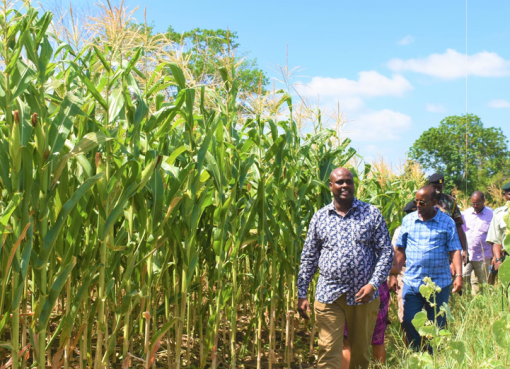The European Union has announced a Sh113.6 million grant towards a plant breeding and biotechnology project to mitigate the impacts of climate change, a project which will be conducted by a consortium of 11 institutions of higher learning spread across the globe.
Kenya’s Egerton University has been named the lead institution which will coordinate the three-year ‘Building Capacity in Plant Breeding and Biotechnology Education and Research through Partnership Programme in Africa, Middle East, and Europe for Agricultural Transformation’ (BREEDTECH) project’ that also brings together institutions from Ethiopia, Palestine, Italy, Serbia, Sweden, and Austria.
Egerton University Vice Chancellor Prof. Isaac Kibwage said the initiative will focus on developing and implementing a harmonised curriculum in Plant Breeding and Biotechnology in the consortium countries, in addition to improving the skills and competence levels of 12 students and 24 academic staff in teaching and research activities at African and Palestinian universities.
The VC said the 2024-2027 project is expected to improve agricultural technologies for better productivity, sustainability, and environmental safety by developing, equipping, and modernising research facilities and infrastructure on Plant Breeding and Biotechnology in the 11 institutions.
Prof. Kibwage observed that biotechnology development remained a top priority in enhancing food security, evolving more efficient and cleaner industrial manufacturing processes, and reducing negative effects on the environment in the country.
“Evidence shows biotechnology has aided so far in increasing food production as scientists aim to make it beneficial to the environment,’’ elaborated the VC.
Dr. Miriam Charimbu, a crop production and protection specialist, and Prof. Paul Kimurto, a Crop Physiologist, both from Egerton University, have been listed as Principal Investigator and Co-Principal Investigator respectively, in the project.
Egerton University has been allocated Sh13,638,528 to undertake the coordination work of the project.
The partner institutions include Laikipia University (Kenya), Haramaya University (Ethiopia), Oda Bultum University (Ethiopia), Al-Quds Open University (Palestine), and An-Najah National University (Palestine).
Others are Pixel – Associazione Culturale (Italy), the Institute of Field and Vegetable Crops (Serbia), Sant’Anna School of Advanced Studies (Italy), the Swedish University of Agricultural Sciences (Sweden), and BOKU – University of Natural Resources and Life Sciences (Austria).
Prof. Kibwage added that through the venture, a total of 150 students from partner universities will participate in knowledge transfer, with 8 centres and laboratories being upgraded alongside the development and review of 20 curriculums.
The packages also entail the development of six research projects in plant breeding and biotechnology, the establishment of three BREEDTECH incubators, and the development of the BREEDTECH Massive Open Online Course (MOOC) in African and Palestinian universities with support from institutions of higher learning in selected European countries.
According to Prof. Kibwage, to ensure that the project has a broad impact across the target regions, plant breeding and biotechnology incubators will promote innovation and product development to support startups and entrepreneurship skills which turn their ideas into successful businesses.
Crop production and protection specialist Dr. Charimbu, indicated that while the project will encompass training of graduate and post-graduate students and staff in Plant Breeding and Biotechnology, it will also mentor young institutions of higher learning to develop and review their programmes in Plant Breeding and Biotechnology across the consortium countries.
She stated that the initiative will also promote and enhance public-private sector partnerships with institutions of higher learning in Plant Breeding and Biotechnology across consortium countries.
Dr. Charimbu concurred that climate change, the severity of drought, the emergence of new pests such as the fall armyworm and maize stalk borer, and diseases such as Maize Lethal Necrosis pose a real threat to food, feed, and nutritional security, which calls for more innovative solutions like biotechnology.
By Esther Mwangi




